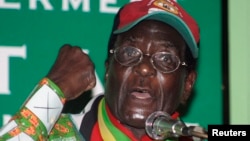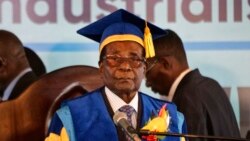Former Zimbabwean president, Robert Mugabe, who dominated the country’s politics and world stage for more than 37 years, died a virtual enigma, silenced after a military takeover in November 2017 barricaded him and reduced him to a mere private citizen.
Like so many of Africa’s longtime strongmen, Mugabe’s leadership ended in humiliation - a military takeover by the Zimbabwe Defense Forces of which he was the Commander-in-Chief, ignited by the dismissal of his vice president, Emmerson Dambudzo Mnangagwa, who now leads the country.
Unlike his boisterous introduction to the world as prime minister of a newly-independent Zimbabwe in 1980, his exit was a more unceremonious, sombre occasion - a resignation letter read in his absence - before parliamentarians gathered to impeach him because of his inability to lead due to “advanced age” and that he allowed his wife, Grace, to “usurp constitutional power,” among other factors.
Resignation
“I Robert Gabriel Mugabe in terms of Section 96 subsection 1 of the Constitution of Zimbabwe hereby formally tender my resignation as the president of the Republic of Zimbabwe, with immediate effect,” read the letter presented in the House of Assembly by Speaker Jacob Mudenda.
In one of his rare appearances after the resignation, the visibly-aged and weakened Mugabe, expressed anger and dismay at his ouster from the party he led before and after independence from British rule.
“I was sacked from the party I founded, Zanu-PF, with the likes of Va(former vice president Simon) Muzenda and others. I was regarded now as an enemy.”
Explaining his decision to resign after much negotiation and mediation, as Zimbabweans were demonstrating for his exit outside his home, Mugabe said he did so to avoid bloodshed and for the love of his country and his people.
“True, I resigned and in the note read in parliament when I resigned, I said I had done so in order to avoid bloodshed, in order to avoid conflict between the army and the people.”
Aged 93 at the time of his resignation, and a presidential candidate for his party for the next election, Mugabe, maintained his hardline stance against West interference in the affairs of sovereign countries like his own, and chastised the military for failing to honor the principles of democracy and unity, on which the country’s liberation struggle was waged and won.
“Those tanks that rolled across the country? Whom were they fighting? Who was the enemy? We were an enemy of ourselves. Fighting ourselves. A Zimbabwe which had right up to independence, yes, fought for the people. Turned through the army against the very people whose interest they fought for. I say no, I still say nooo. This was wrong, this is the greatest damage we’ve done to our history, the greatest injustice we’ve done to ourselves.”
Zimbabwe is for Zimbabweans
Undisputed by many over his 37-year rule, was Mugabe’s efforts, particularly in the early years of his leadership, to empower his fellow citizens through education, and prosperity, on which he ordered the controversially-executed land reform. For this, Mugabe paid the cost of isolation from such countries as Britain and the United States, which he often accused of trying to re-colonize Zimbabwe.
In his first years in office as prime minister and then executive president from 1987, Mugabe embarked on ambitious programs to empower his compatriots, some of which drew praise at home, regionally and abroad. He was praised for embarking on what was regarded as a vibrant education system but condemned internationally for the lop-sided land reforms, resulting in the imposition of targeted sanctions by several western countries.
On education, Mugabe, renowned for his attainment of seven earned degrees before and during the liberation war, prided himself for making Zimbabwe a shining example.
“When I started my government, I took into account the promises that we had made to our people. I raised the level of literacy of my people and that was recognized by UNESCO, we became number one. And in regards to education of our children, all children had education. And today, go, say go to South Africa, go (to) any neighboring countries and you’ll find Zimbabweans there.
Land Reform
Another one was land reform, aimed at giving indigenous Zimbabweans access to arable land on which the country’s economy was based. To the end, Mugabe defended his decision to embark on the aggressive land reform exercise in 2000, that forcefully removed an estimated 4,000 white commercial farmers from lucrative pieces of land, on which black Zimbabweans were merely workers, not owners.
In his defense of the land reform program, described by many as erratic and disruptive, including the indigenous black workers, Mugabe’s actions were based on an agreement with Britain, and its prime minister at the time, Margaret Thatcher.
“We agreed with Madam Thatcher, with her government, that there should be reform, land reform in the country. Yes, let the people get the land back. Joshua Nkomo and I insisted we had to get land, and the British agreed. But we just differed on the issue of compensation – whether they would give enough compensation. So we started, we had to get the land.”
Economy, Indigenization
While applauded by some, Mugabe faced much criticism internally, with many attributing the country’s economic downslide that ushered in record hyperinflation, closure of industries and mass exodus of citizens to foreign countries, to the land reform exercise. Unfazed by the critics, Mugabe hinted only slightly that it failed to meet the full expectations of the indigenous Zimbabweans it was supposed to empower.
“We assisted people in developing their land. They … we gave them land, yes. But the resources with which to develop the land in some cases, fell short … We certainly did our best.”
In reaction to the forceful land grabs at the time, as well as allegations of human rights violations and rigged elections, western countries led by Britain and the United States took steps to isolate Zimbabwe, and impose sanctions, which still today remain a major source of debate. Mugabe bitterly condemned the sanctions and, argued for their removal at every occasion, including the United Nations and the African Union. He also launched a global petition for their removal. The sanctions are targeted at specific individuals and are under constant revision based on reforms. However, calls for their removal have grown, with many echoing Mugabe’s claims that they are illegal, and the real source of the country’s economic decay.
“We say sanctions are wrong because they are not based on any valid grounds at all.”
In retaliation to the sanctions, Mugabe declared a counter-attack against the West, by embarking on an indigenization program that outlawed foreigners from owning majority stakes in any company.
"It's now time that we impose our own sanctions. I have instructed the Minister of Indigenisation and Empowerment, Mr. (former minister Saviour) Kasukuwere to start with action on British companies. We must take them over. We have nothing to be ashamed of."
Despite rebuke from even economic and political experts in his own country, who feared investor flight that would further strangle the economy, Mugabe signed into law the Zimbabwe Indigenization and Economic Empowerment Act, which compelled foreign-owned companies to transfer equity stakes of up to 51% to black Zimbabweans. Mugabe argued that the 49 percent shareholdings for foreign-owned companies was reasonable.
“Forty nine percent is a hell lot of equity and only foolish ones who would say so. Wise ones would take it up.”
In an attempt to attract the much-needed foreign direct investment and lesson Zimbabwe’s high risk business profile, Mnangagwa revised the indigenization law in March 2018 with restrictions only in the diamond, platinum and other economic sectors reserved for citizens. The revised law clearly stipulates that in other sectors any person is free to invest in, form, operate and own or control businesses without restrictions.
Pan-African
Mugabe, who served at various times as chair of both the African Union and the Southern African Development Community, was seen by many as a peacemaker and unifier. In 1987 he signed a Unity Accord with Joshua Nkomo, leader of the opposition Zimbabwe African People’s Union, to end a bitter conflict in the Matabeleland and Midlands provinces in the early 1980s which left an estimated 20,000 people dead. In 2009, he again entered into a power-sharing agreement with the late Morgan Tsvangirai, then leader of the opposition Movement for Democratic Change, to end violence fueled by a contested election. Outside Zimbabwe, Mugabe also participated in the mediation of several regional disputes. Reflecting on this legacy, Mugabe said he tried his best.
“To unite our people, various tribes and make them one nation. To work with our neighbors in establishing systems that held us together. Regional organization – SADC and others. I think I tried to do my best and to bring that spirit, belief in the African people, in our people, that they are as good as anyone else in the world. Believe in themselves. Anti-colonialist, I thought I was, and still I am. So those are some of the things I hope I can say in retrospect, I managed to strive for and succeed in imparting, or be it partially perhaps.”
Gender Equality
Mugabe also prided his record on gender equality at work places.
“We said equality, equality for women and men. And what did that mean. We found in the system, in that not only were black people discriminated against in regards to wages and other social benefits, but that there was also discrimination against the women, and for that matter, European women as well, and we abolished that. We said no, wages for equal work, must be the same. So we raised the status of women, I want to believe, but that status still needs to be raised.”
Mugabe fought for the emancipation of the Saharawi people, Palestinians and others in general as he attempted to stop what he called western imperialism. He attacked the West for facilitating in the removal of such leaders as Iraq’s Saddam Hussein and Libya’s Colonel Mummer Gaddafi.
Despite the pressure to denounce his wife who many saw as eyeing the presidential seat, Mugabe, who dismissed claims he was positioning her to replace him, stood by her and called for an end to attacks against Zimbabwe’s former first lady.
“I don’t accept the denunciations and vilifications that are going on of my wife, everyday in the paper, for nothing. I don’t know why. Perhaps through her they think by attacking her, and they are attacking me. That’s what I think those who write, in the Herald, especially. Leave, leave, leave my wife alone. I want Grace to remain Mai Grace.”
Founding Father
While the fallout with his party resulted in his isolation and confinement to his mansion in Harare, Mugabe maintained the respect of his fellow Zimbabweans. At various times after facilitating his removal, Mnangagwa still recognized him as the country’s founding father.
“He is the one we refer to as the founding father of the nation of Zimbabwe. He is our founding father of free Zimbabwe.”
The respect extends even to political rival, MDC leader Nelson Chamisa, who, following the announcement of Mugabe’s resignation, acknowledged Mugabe’s contributions.
“We must give him the respect. He did so much for us, as a people, but he also did bad things but we must not amplify the bad things he’s done. Let’s look at the good he has done, let’s look at the bad, we correct them and move forward as a country.”
Mugabe’s legacy as Zimbabwe’s first elected prime minister and president will continue to be a topic of debate even if he died an isolated man, relegated to a private citizen.






